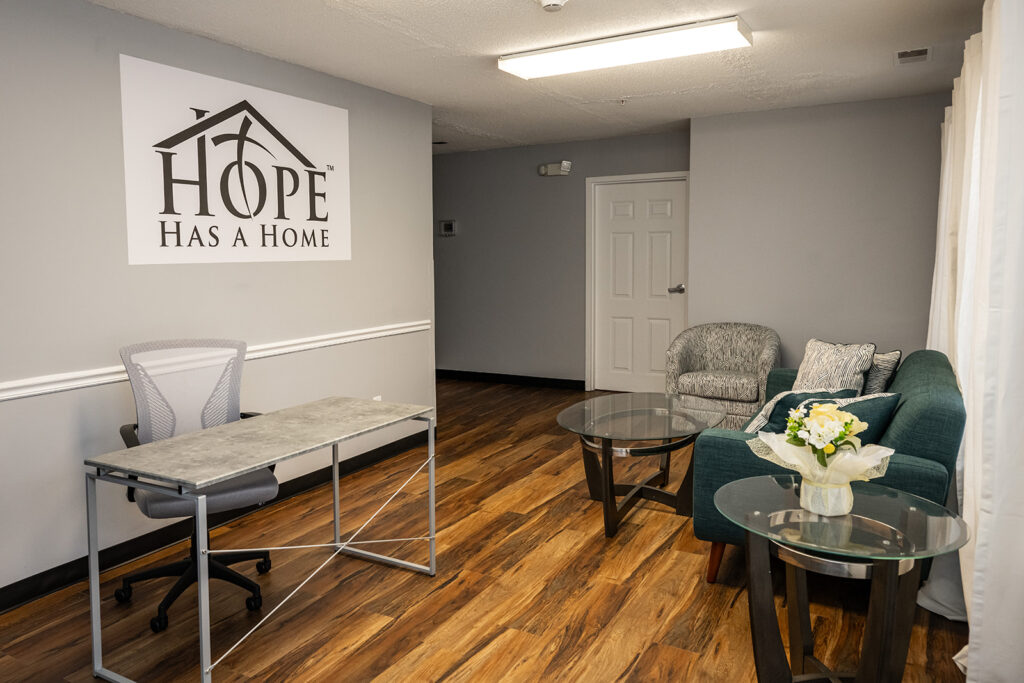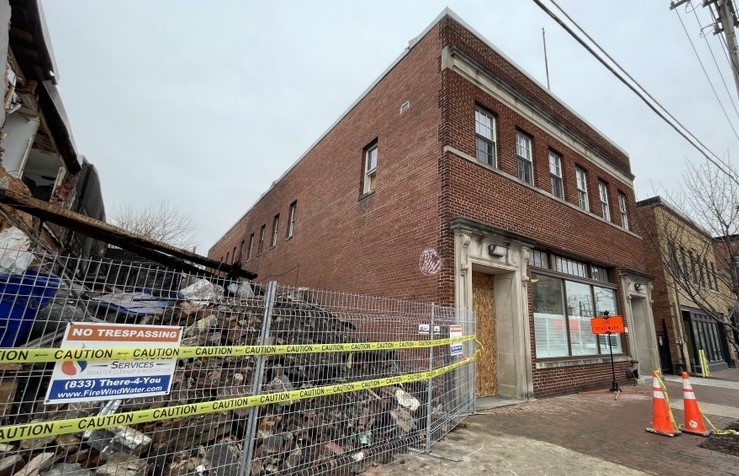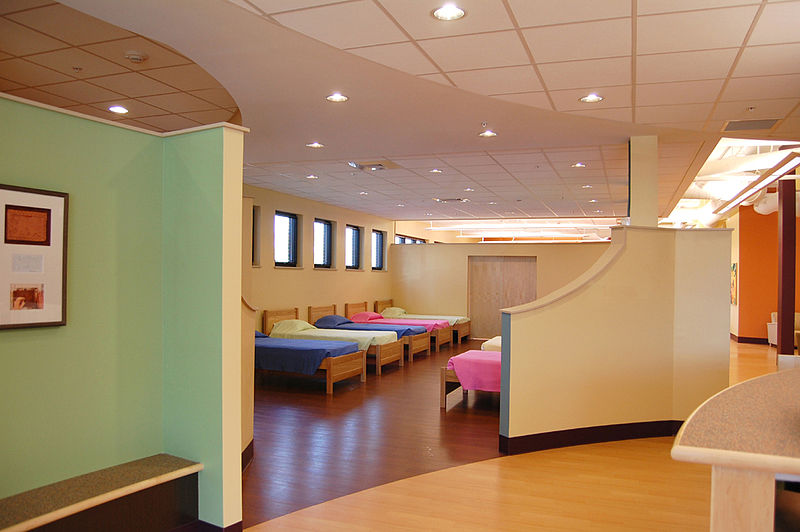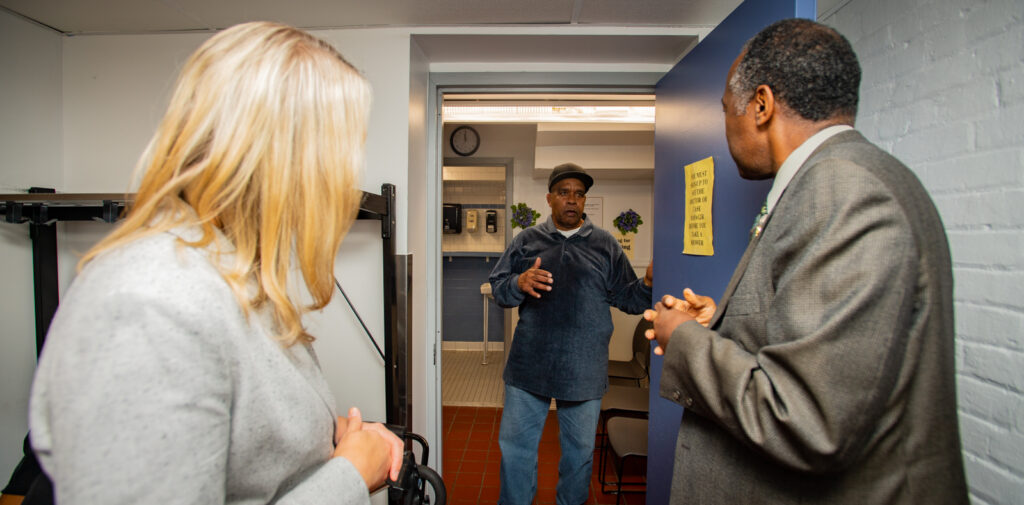Jeff Tooles turned his back on the crackhouse in Annapolis on a cold, wet night in 1991.
He knew he had to escape.
His addictions to drugs and alcohol were ruining his life. He had touched rock bottom. He knew if he stayed in Annapolis, his life would continue to spiral down, and down. He started walking. He knew he couldn’t turn back.
“All I knew is that if I go back this way, I’m going to die; so I just kept walking and walking.”
He didn’t know where he was.
“I didn’t have an answer.”
All he knew was that he had to keep going. It started raining and he was hungry. He just kept putting one foot in front of the other. He walked 31 miles, all the way to downtown Washington, DC. When he got to the city he asked a man on the street where he might find help. The man suggested going to the Central Union Mission. Tooles went there. He got a meal, a change of clothes and a bunk, where he spent the night. In the morning, he talked with the chaplain about his life. He mentioned he had attended a Baptist church when he was young but had “stepped straight away” from religion as he got older.
The chaplain told him about Central Union Mission’s spiritual transformation program. Tooles decided to give it a try.
The 14 months he spent with the program changed his life. He left the Mission for a job in a nursing home in Northeast DC called Midlantic Manor, got his own apartment and bought himself a car. After being “rescued” from his downward spiral, he felt “tremendously better.” When he had been addicted, he had spent time in jail. His mind had been so addled by drugs it had stopped working.“I couldn’t remember what I just read.” Being clean had allowed his mind to heal. “Now I’m completely better,” he can say today.
Tooles took a computer certification course. He also began to think about becoming an electrician. He went to the Brotherhood of Electricians office in Landover, MD, and took a test, with the idea of going to school to obtain a master electrician rating. He also thought of pursuing the training he would need to become a heating and air-conditioning mechanic. But though he was moving steadily forward, he never forgot his connection to Central Union Mission. During his Tuesdays and Wednesdays off from the nursing home he volunteered at the place where he first began to rebuild his life.
“I felt like this is where my life-changing experience happened, so I wanted to give back.” He started cooking for the men. The mission’s executive director at the time, Tony Marciano, seeing Tooles’ attitude and dedication, called him to his office. He told him he wanted to give Tooles a stipend as a token for his work to save him some commuting expense. Two months after that, Marciano called Tooles back to his office, noticed that he had been praying, and suggested Tooles join the ministry.
“Because I wouldn’t go away,” Tooles said. “I just kept coming back,” and added, “I looked at him and said: you didn’t need to tell ME that.”
“I’ve been here ever since; I love it.” Tooles stayed with Central Union Mission’s food service and now manages it; he is responsible for the entire organization, including banquets. He’s now been there 20 years.
(A reporter on a recent visit there who got fed while doing story interviews can testify that the food quality and quantity far exceeded what he anticipated, and would be an incentive for anybody to want to come there and eat.)
Tooles said he likes being a servant. “It just brings joy to other people’s lives. It fills me with joy; and it feels good to be a blessing to somebody. I’m ready to jump in wherever you need me.”
He often acts as a local area recruiter for the center. When he is in his car on the street and sees somebody in need, he says, “Get in, get in, just get in; I’ve got something to show you.”
Tooles related his transformational experience to his brother and nephew, who both went through similar troubles and lived in the same Annapolis house. Both men have also managed to turn their lives around. Tooles’ nephew is now in the U.S. Army. He is married and the father of two, stationed in N.C.
His brother now works for the U.S. Naval Academy’s food service.
A New Home
Central Union Mission itself has been through some serious changes in its 130 year history. Started in 1884, in the wake of the Civil War, as a gospel rescue ministry for the city’s needy and homeless, it is the oldest continuously operating shelter in Washington. It has survived world wars, gentrification projects and numerous relocations.
But three and a half years ago the institution’s future seemed to hang in the balance. The Mission’s old home, located in a rapidly gentrifying area, on the corner of R and 14th Streets NW was under contract to a developer. At the same time, the Mission’s plan of moving to its current location in the city-owned building near Union Station was being challenged.
Neighborhood activists worried that the homeless shelter would bring crime and trouble to their community. Civil libertarians, citing the Mission’s long history of requiring men to participate in religious services, were concerned that city support for the mission would violate the principle of separation of church and state.
The community activists were offered assurances that the Mission would be a force for good in their neighborhood. Shelter officials also responded to the civil libertarians’ worries, stating that the Mission had dropped its requirement that men attend daily prayer services in 2007. Men who do not wish to pray are allowed to spend the time in quiet contemplation, they said.
After lengthy negotiations with the city, the Mission signed a 40-year lease on the Gales School building with a 25-year extension.
Months of work and a multi-million dollar construction project ensued. Today, the freshly-renovated facility at 65 Massachusetts Ave., NW is considerably larger and better-designed for the Mission’s work than the old place, noted executive director David Treadwell as he proudly led a tour. The well-lit interior design seems inviting. The move has enabled the center to now have 170 beds for homeless shelter residents, up from 140 before. On dangerously cold winter nights, the staff puts out extra beds, accommodating as many as 190 men.
“Word is getting out that we’re here and we’re good,” Treadwell said. “This is a clean, safe place with lots of food; it’s worth giving us a try.”
Many of the men just stay as overnight guests. Others stay much longer. These days Central Union Mission offers three programs for these long-term residents: spiritual transformation, job readiness and educational support. Residents who have jobs are asked to offer a monthly payment for their room usually ranging from $100 to $150 per month. The idea is to get them in the habit of paying rent, but not to exhaust their earnings.
The new facility includes a suite of rooms designed to house a family having an emergency. There is also a weight room for working out, a clothing room, a large spiritual living room.
Some beds are grouped in spacious, well-lit dormitory-style rooms. Other beds are placed in smaller rooms offering more privacy to men who have advanced through Mission programs.
While there are other shelters in the city, Treadwell believes that Central Union Mission gets closer than some others in truly addressing the root of people’s problems.
“We’re an emergency facility for people overcoming their emergencies.”
In the new location, shelter staffers have resumed the work they have done for decades: offering men such as Tooles refuge from the streets and offering them beds, food and and other necessities such as identity cards.
“Anyone who wants to come in, we take them,” Shirley Johnson, director of social work.
When and if the man is ready, the task of rebuilding a life begins. Prayer is part of the work. So is reuniting with loved ones, said Johnson.
“We infuse the gospel with them and we sense change in the men from their conversation and how they approach their family.”
Some of the men have never had a job, and Central Union Mission offers them job training, which enables them to start a career. The goal is always self-sufficiency.
The staff members see themselves as working through God, and several said in interviews they think God meant them to be there and make this their life’s work.
Johnson added that in many cases, nobody’s ever sat down with the men and listened to them. Often they have experienced trauma they need to talk about. They may have been sexually abused or told they were ugly and worthless.
“A lot have been feeling unloved and under-valued,” said Johnson. “Most of the men who come to us are broken; we offer them our faith and love.








